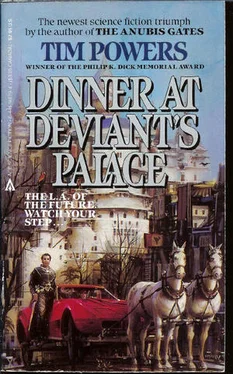«Okay,» the old man said quietly. «Ten. Five now and five when you bring her back.»
«Done. See me after the show tonight to set up the details.»
Barrows nodded, got to his feet and edged around the table to the door, but paused. «Oh, by the way,» he said uncertainly.
Rivas looked up, clearly impatient.
«Uh, there's something that's been . . .puzzling me for thirteen years. Maybe I shouldn't ask.»
Rivas was afraid he knew what was coming, but he said, «Yes?» casually.
«Why—excuse me, I don't by any means insist on an answer—but on that night I had you driven off, why were you behind those bushes on your hands and knees, throwing up and . . . barking?»
Rivas was humiliated to realize that his face was turning red. Why, he thought, can't he and I forget that damned incident? «You've been wondering about that for thirteen years?» he asked.
«Yes.»
Rivas shook his head and waved at the door. «Keep on wondering.»
* * *
After Barrows had left, Rivas sat back and tilted up his glass again, and then, gingerly, he gave in and allowed himself to remember that disastrous night—the first and last time he'd ever tasted the Currency brandy.
It had been in the fall of—Rivas counted the years on his fingers—the sixth year of the Sixth Ace, and Urania Barrows had decided to invite Gregorio, her fieldboy lover, to her gala seventeenth birthday party. Though only the son of one of the tenant farmers, the eighteen-year-old Gregorio had managed to save some money—a fifth and some change, big money to a field hand—and on the day of the party he spent it all on renting a suit and getting a haircut and a presumptuously aristocratic shave. And he went to the party, and in spite of being terribly nervous in the sophisticated company, he had made a good impression . . . until the brandy was served.
Young Gregorio had been drinking wine since childhood, but distilled spirits were new to him, and he didn't know that one was supposed to drink them more slowly. He eventually realized that he was foolishly drunk and embarrassing Urania, so he left the party . . . and as soon as he was out in the fresh air, it occurred to him that he was sick.
Not wanting to be seen vomiting, he'd reeled off the path into a tiny clearing behind some bushes and then, on his hands and knees, begun the lengthy process of expelling the brandy from his stomach.
And at one point, when he'd paused for breath, he heard a lady on the path asking someone about the peculiar noises coming from behind the bushes. A man's voice replied that it sounded like a dog.
Rivas shuddered now, and drained his beer. He remembered that he had desperately wanted the people to forget about the noises and go away, and somehow he'd concluded that the best way to accomplish that would be to convince them that it was indeed only a dog, and not anything that needed investigating^ So he'd begun . . . barking.
He stood up now and opened the door, but he was unable to avoid remembering the rest of it, his last conscious moments of that disastrous evening . . . when he'd finally opened his eyes and seen Irwin Barrows's boots six inches from his face.
He left the little room, swinging the door shut behind him, and as he reeled back toward the stage—the alcohol had caught up with him again—his eyes only half saw the dim bar and the stage ahead and the uneasy faces watching him; overlaid on that scene like a second transparency he was seeing again the One-a-One Freeway, seeming because of the thick fog to be a solitary track across the chilly sky, down which he'd fled on foot on that awful dawn thirteen years ago. He'd been shivering with cold and dizzily sick from a concussion as well as a hangover, for the outraged Irwin Barrows had given him a solid kick in the head before dragging him out from behind the bushes and ordering the kitchen crew to carry him away and dump him somewhere outside the Barrows land boundary.
He'd walked all that day, and as the sun rose and gradually scattered the fog, he'd seen for the first time the weathered and vine-hung ruins of big old Ellay, noisy now only with the chatter of parrots and monkeys. Decrepitude lent the still imposing building shells an air of tragic grandeur that they couldn't have had in life, and the sheer number of them—they stretched like ranks of uncared-for tombstones to the horizon—awed the young Gregorio; several times his curiosity had outweighed his sickness and haste and numb sense of loss, and he'd gone exploring through old rooms and up and down alarming, rubble-strewn stairways. By the time he finally sighted the high west wall of Ellay, only its top trim of crenelations was still lit by the low red sun. The summer-shrunken river beyond the city was invisible in the darkness, and fear of hooters and hemogoblins made him ignore his headache and cover the last couple of miles at a run.
That had been the first night he'd ever spent out of his father's house, and, after a couple of hours of unhappy wandering through the streets, he'd spent it in a corner of a shed in Dogtown. He hadn't been the only vagrant to seek shelter there, and he was awakened several times by the abrupt awareness of, and then the weary effort of refusing, the affectionate attentions of one or another of his shedmates. One young man, offended at having been rebuffed, had asked Gregorio if he'd care to leave the city right at that minute by the Dogtown gate. Rivas had politely refused . . . and been very glad of his refusal when he learned, years later, that there was no such gate, and that the phrase «leave by the Dogtown gate» meant to disappear, figuratively or literally, into one of Dogtown's ubiquitous, feculent trash trenches.
The next morning, stunned by hunger and exhaustion, he'd set out walking, and in the South Gate area by Sandoval Street he'd met the group of the zealots popularly known as Jaybirds . . . the wonderfully concerned, shoulder-patting, sympathetically smiling Jaybirds.
Steve was right, he thought uneasily when he stepped back up onto the stage and surveyed the crowd—quite a few people have left. How long was I in that room talking to Barrows? It'd probably be an error to ask, admit I don't know. Goddamn whiskey. No more beer or anything for you tonight, man!
He started to signal for «Everybody Wants to Smoke My Comoy,» and then remembered that he'd already used it and signaled instead for «Drinking Alone.»
Fandango sighed audibly as he started the song. Oh, look on the bright side, Tommy, Rivas thought—the next main attraction performer they get in here will probably want to do nothing but Scrap and Bugwalk.
Somehow the clear blue sky visible through the unglassed windows only made the interior of the Toothtalker's room look shabbier. The Toothtalker herself, it occurred to Rivas, looked like just one more piece of faintly morbid antique trash to avoid tripping over. The thought made him smile in spite of his headache. Yes, he thought, among all these pictures and specimen jars and rotted books and bits of incomprehensible old-time machinery, she looks like a desiccated old mummy. The lower jaw, perhaps due to some error in taxidermic technique, had gradually pulled away from the face as the unwholesome memento dried out, finally leaving the effigy frozen forever in a stressful but inaudible scream.
A mummy which, he added as once again she treated her guests to some of the eerie low gargling she was so good at, has become inhabited by baritone mice. In spite of being irritable and grainy-eyed from a nearly sleepless night, Rivas had to strangle a chuckle. The effort made his headache worse.
He glanced at the chair beside him and saw that Irwin Barrows was sitting hunched forward, anxiously watching the motionless, gargling old woman. Rivas was surprised– he had thought that Barrows's insistence that they consult a Toothtalker before Rivas embarked on the redemption was nothing more than a formality, a traditional gesture like letting a wagon «warm up» for a few minutes on cold mornings before flicking the reins and getting started . . . but the old financier was obviously as credulous as the stupidest scavenger who ever shambled up these tower stairs to hear the judgment of the spirit world on which beyond-the-wall districts were particularly favored or imperiled by the configurations of the stars.
Читать дальше












